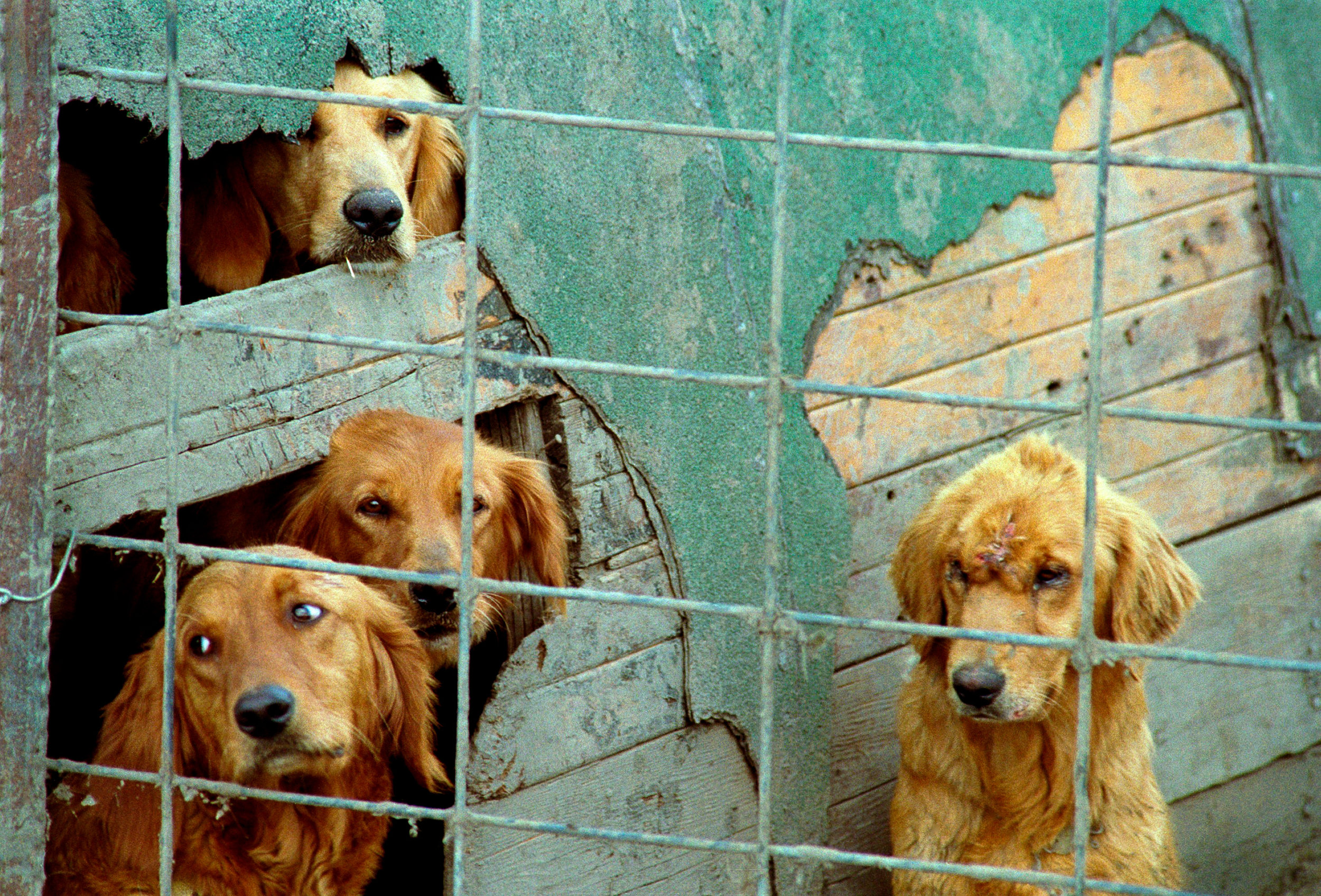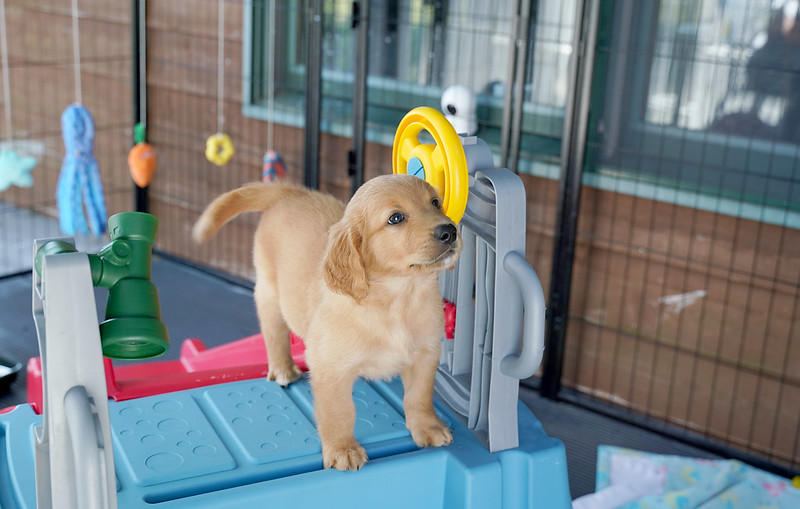A common source of the behavior problems our clients come to us for help with is that they have chosen a dog that either was a poor match for their lifestyle, or has health or temperament problems due to genetics and/or their litter was not raised in an ideal environment. It’s easy to understand how a litter raised by well-socialized, healthy, and happy mother in a clean, comfortable whelping environment with quality nutrition, low stress, and regular socialization opportunities and handling is going to be better set up for success than one that is raised in a dirty, wire-floor cage or outdoor kennel at a crowded, noisy puppy mill with minimal socialization/human interaction and parents who were not selected for health or temperament problems before being bred.

But when it comes to adding a dog to your household, popular culture may lead you to believe that you only have two options 1) adopt, or 2) shop. It is not that simple however, and there are multiple adoption routes, and multiple shopping routes. Some are reputable, and some are not. Below is a list of factors to consider when deciding where to get a dog from, and determining if the source is reputable.
Adopt OR Shop
Good dogs can come from anywhere, and every dog deserves a loving, lifetime home. There isn’t a “best” place to get a dog for all families, and there aren’t moral or ethical implications of adopting vs buying a dog.
Predictability
Dogs do not reach maturity until 2-3 years of age. Anytime you bring in a young dog, you can expect to see a personality change as they mature. Sometimes that change can include some unwanted increase in drives, or aggression, or decrease in sociability. Training and socialization can really help ease the transition into adulthood, but it can’t change the dogs personality. It is nurture AND nature.
That risk can be minimized by either 1) adopting an adult dog with know history (or one that has been in foster for some time), or 2) buying a puppy from known lineage (stable temperament parental dogs).
Availability of Type
Your choice of adopt or shop may be decided for you, depending on what kind of dog will fit best into your lifestyle. Sometimes it is hard to find low-shedding breeds in shelters and rescues, for instance. And sometimes it is difficult to purchase an older, established dog.
If you want a specific breed or breed mix, you may be limited to breed-specific rescues, or breeders.
Importance of Function
How important is it to you that your dog can participate in certain activities? For example, if you want to take your dog hunting with you, you would need to find a hunting bred dog with proven parents to do that with.
Figure out what might a deal breaker for you, and make sure the dog you choose to add to your family is likely to be able to do those things with you.
Adoption Options – Shelter or Rescue
Most counties have a government funded shelter associated with Animal Control that is where local owner surrendered, stray, and confiscated animals go. These shelters are often high turnover, with limited resources. Dogs also can be quite overwhelmed in a shelter environment, so sometimes it is hard to get a true sense of a dog in that setting.
Really wonderful dogs make their way through shelters, but the risk with adopting here is that the dogs’ histories and personalities are largely unknown, and you won’t get to really know the dog until they have been home and start to settle into their new environment. This is especially important to keep in mind if you have other animals or young children in the home. Shelters have limited resources and a lot of times limited information on the dogs coming in. Example, if you own a cat and rescue an adult dog, how certain are they the dog can co-exist with a cat in the home?
Rescues are volunteer organizations that accept unwanted dogs and work to place them in new homes. This category can represent a WIDE range of organizations. Some have facilities, and some are run entirely out of people’s homes. Rescues can pick and choose which dogs they will accept, and can take their time interviewing potential adopters and matching them with an appropriate dog.
The risk with rescues is that anyone can start a rescue, and loving dogs alone does not make you a competent dog professional.
Some green flag behavior from rescues would include: 1) honesty about the dog’s background, including behavior and health problems, 2) adopters are required to fill out applications and complete interviews and/or home checks before being approved, 3) dogs are adopted out on spay/neuter contracts or are already fixed. 4) requiring dogs be returned to the rescue if they can’t stay in their new home.
Some red flag behavior from rescues would include: 1) only accepting the most adoptable dogs so they can invest minimal funds into a dog before collecting adoption fees (“retail rescue”), 2) limiting adopters ability to choose training and lifestyle choices for themselves. If there are training, food, or veterinary restrictions in the adoption contract, RUN. 3) charging higher adoption fees for certain color or type of dog. 4) refusing to take back dogs they have adopted out when behavior problems become known.
Taking a dog from a friend or family in need of re-homing their dog can be a great way to add a dog to your household. In many cases, you know what kind of lifestyle the dog did or did not do well in, their medical history, training history, and any potential problems that might arise. If you had a relationship with the dog prior to the transfer of ownership, that often makes the transition easier on the dog as well.
Shopping Options
We hear a lot about the importance of finding an Ethical Breeder –but what someone considers to be an ethical breeder can become a controversial topic. To us, an ethical breeder is one who does the following things.
1) Breeds for a Purpose. That purpose may be companionship, creating sporting dogs, is trying to improve the temperament or structure of their dogs, to create hunting dogs, etc.
2) Health tests their breeding stock. Health testing is NOT the same as a regular vet check up. They should run the recommended testing listed on the Canine Health Information Center program, and register their dogs with CHIC numbers. Most will not test until the dog is at least 2 years old (sometimes a little younger for toy breeds) as the dogs are still developing and problems would not come up yet that breeders are trying to prevent in their breed. Breeding young dogs should be a red flag.
3) Matches puppies and owners. The breeder should have an application and/or interview process to get to know you, and match you to the puppy that will best fit your lifestyle.
4) Takes back dogs. Should you need to re-home your dog, the breeder should take the dog back at any point. Ethically bred dogs should not end up in shelters and rescues.
Those are the bare minimum requirements for us for ethical breeding, but there are still a few other factors to consider.
Are they proving their dogs? We want to select breeders that are proving their dogs through a third party. If they are breeding to improve structure, are their dogs finished champions? If they are breeding to create family pets, are any of the dogs participating in therapy dog work? If they are breeding to create sport dogs, are any of their dogs titled in obedience or agility or IPO?
How are they socializing their litters? Do they participate in early neurological stimulation? Do they have people over to meet the puppies? Do they take the puppies outside?
How are they to deal with in general? If you’re lucky you will have a relationship with this person for the life of your dog. Is this someone you can send updates and questions to?
Ethical breeders can be more expensive than some of the other options here, but they also have put a lot more into raising the puppies, choosing the parent dogs, etc. and are setting the puppies up for the most success possible.
How to find an ethical breeder? Breeds usually have a breed club associated with them. For example, Tibetan Spaniels will have TSCA which is the Tibetan Spaniel Club of America. When you look at the actual breed club page, they will have recommendations for breeders that are in good standing with the breed club. We recommend reaching out and talking to breeders and most are willing to even meet and show you their dogs or meet at a local show or event.

Puppy Mass Retailer
This is the infamous “puppy mill” category. It is not always as awful as the TV commercials, but they are also not meeting the criteria outlined to make them ethical breeders. Dogs in pet stores are pretty much without exception sourced from mass production breeders, and the Amish are also puppy mass producers. They are also great at tricking potential buyers online with cute puppy photos and words like “champion bloodlines”, “teacup” or “exotic”. Anyone selling a dog with an out-of-breed standard color or size, or has multiple breeds available is usually going to come with a lot of red flags as well. Remember –Anyone can post a puppy online even on sites like AKC marketplace. It is important to ask questions to the seller if they do any of the above things in the ethical breeder section and you can usually quickly figure out who a mass retailer is instead.
The benefit of these sources is that you can often get a puppy quickly, and cheaply. Buyers can purchase puppies from these sources with little to no vetting or application process. The primary purpose of pairing the dogs in these facilities is to create sell-able puppies, so the breeding dogs are not health tested or proven or paired together in a purposeful way. They live in breeding facilities and not in homes, and the puppies rarely get personalized attention or socialization.

We don’t recommend this option when shopping for a new addition. Dogs deserve to have relationships with other dogs and people, and not live in breeding facilities (even if they are clean and spacious). They also can run a higher risk of health and temperament problems. Mass retailers can be cheaper than an ethical breeder, but it typically is a get what you pay for situation, and you may end up spending more on training or vet bills in the future. If you want the best chance at purchasing a puppy that is going to live in your home successfully, buy the puppy from someone who is living with their dogs in homes.
Oops Litter / “Backyard Breeders”
In this category, I would put all other breeders that don’t meet our standard for ethical breeding outlined above, and one-off, accidental litters. Most often, dogs bred in this category are family dogs, so chances are they are at least mildly successful at living in a home environment. You are also likely to know the parents of the puppies and be able to get a feel for their temperaments. Be aware if the parent dogs are under 2 years of age as you will not have a real feel of their true temperament until maturity.
When acquiring a dog from this source, be aware of what you aren’t getting (health testing, proven structural soundness, purposeful puppy rearing, etc), and if you are comfortable with that risk associated with not having those things, and the dog is a good fit for your lifestyle, go for it! We also recommend in this case asking about the parent dogs’ lifestyle and personality, making sure they don’t possess traits you’d prefer not to have in your own puppy.
Adding a new dog to your household is a big decision, and is never one that should be rushed or done without careful research and consideration. If you ever would like assistance or advice when picking a new dog or breeder for your family, please reach out to us! Or, if you have unwittingly gotten a puppy from an not-so-great breeder, we’d be happy to assist with training instruction and socialization classes to give your pup the best shot possible to help them grow up to be the best dog they can be.


